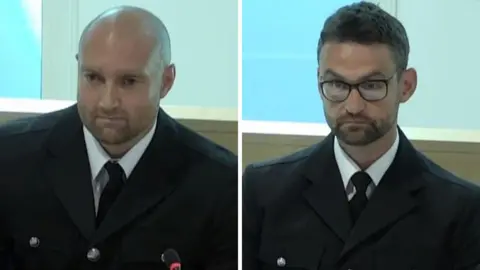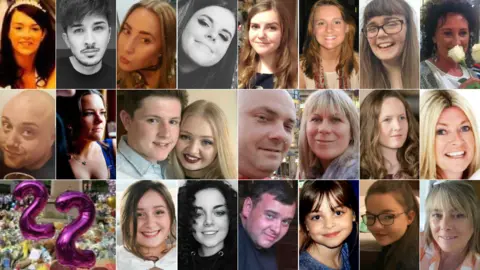Manchester Arena Inquiry: Police deny stopping doctor in aftermath
 Manchester Arena Inquiry
Manchester Arena InquiryTwo armed police officers have denied stopping a doctor from going into the Manchester Arena bomb scene.
PC Troy Tyldesley and PC James Dalton were guarding one of the entrances to the arena foyer in the immediate aftermath of the 2017 attack.
Dr Michael Daley has previously told the public inquiry officers stopped him because the area was not safe.
Mr Tyldesley, of Greater Manchester Police, said there was "no reason" why he would stop anyone going to help.
He said he could not remember the encounter with Dr Daley, but did not believe he stopped anyone.
The two officers were among the first armed responders on the scene, arriving at the arena about 10 minutes after Salman Abedi detonated the homemade device.
They went through the foyer before stationing themselves at the bottom of a staircase on Victoria Train Station.
The hearing was shown CCTV stills of the officers allowing various emergency service responders and non-emergency service personnel through to the bomb scene.
Only three paramedics ever went directly into the foyer, where the bomb had exploded.
 Family handouts
Family handoutsMr Tyldesley said: "The actual City Room was as safe as it's going to be at that time. We're not going to make it any safer. We need to get help in there for them people."
Counsel to the inquiry Nicholas de la Poer QC asked Mr Dalton: "Do you have any recollection of seeking to prevent anybody who was responding to the emergency in a positive way from going up those stairs?"
He replied: "No."
'Every second counts'
Mr Dalton told the court: "We've been into that room and we've seen the catastrophic injuries to these people.
"We've made that as safe as we can for those people to go in and operate and give those people the help that they needed.
"Unfortunately every second counts in that situation."
The inquiry also heard more evidence about fire control operators failing to pass on key information on the night of the attack.
North West Fire Control has apologised for "significant failures", which contributed to the delay in getting firefighters to the scene.
Call operator Rochelle Fallon admitted to the hearing that she should have told a senior fire officer that both police and ambulance crews were already at the arena.
She said although the incident log was difficult to read, she should have passed on that information.
"I should have taken my time with it and I should have given him that information and I haven't," she said.
"I'm not just going to blame the system for that, the information was there if I'd taken the time to read through it."
When she was asked if the events of that night had affected her confidence in the job, Ms Fallon replied: "I believe that some of the things that I've not done rather than done have contributed to some people, that I knew could have, perhaps, survived."
Ms Fallon, who joined North West Fire Control in 2014 told the court that she felt there should be more "scenario-based" training.
The inquiry continues.

Why not follow BBC North West on Facebook, Twitter and Instagram? You can also send story ideas to northwest.newsonline@bbc.co.uk